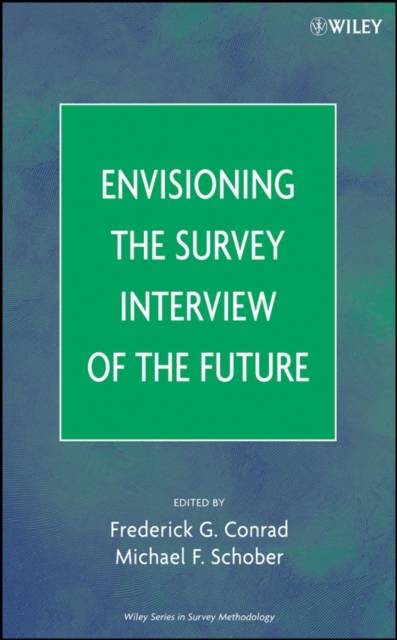
- Retrait gratuit dans votre magasin Club
- 7.000.000 titres dans notre catalogue
- Payer en toute sécurité
- Toujours un magasin près de chez vous
- Retrait gratuit dans votre magasin Club
- 7.000.0000 titres dans notre catalogue
- Payer en toute sécurité
- Toujours un magasin près de chez vous
Description
"This book is an excellent introduction to some brave new technologies . . . and their possible impacts on the way surveys might be conducted. Anyone interested in the future of survey methodology should read this book." -Norman M. Bradburn, PhD, National Opinion Research Center, University of Chicago
"Envisioning the Survey Interview of the Future gathers some of the brightest minds in alternative methods of gathering self-report data, with an eye toward the future self-report sample survey. Conrad and Schober, by assembling a group of talented survey researchers and creative inventors of new software-based tools to gather information from human subjects, have created a volume of importance to all interested in imagining future ways of interviewing." -Robert M. Groves, PhD, Survey Research Center, University of Michigan
This collaboration provides extensive insight into the impact of communication technology on survey research
As previously unimaginable communication technologies rapidly become commonplace, survey researchers are presented with both opportunities and obstacles when collecting and interpreting data based on human response. Envisioning the Survey Interview of the Future explores the increasing influence of emerging technologies on the data collection process and, in particular, self-report data collection in interviews, providing the key principles for using these new modes of communication.
With contributions written by leading researchers in the fields of survey methodology and communication technology, this compilation integrates the use of modern technological developments with established social science theory. The book familiarizes readers with these new modes of communication by discussing the challenges to accuracy, legitimacy, and confidentiality that researchers must anticipate while collecting data, and it also provides tools for adopting new technologies in order to obtain high-quality results with minimal error or bias.
Envisioning the Survey Interview of the Future addresses questions that researchers in survey methodology and communication technology must consider, such as:
-
How and when should new communication technology be adopted in the interview process?
-
What are the principles that extend beyond particular technologies?
-
Why do respondents answer questions from a computer differently than questions from a human interviewer?
-
How can systems adapt to respondents' thinking and feeling?
-
What new ethical concerns about privacy and confidentiality are raised from using new communication technologies?
With its multidisciplinary approach, extensive discussion of existing and future technologies, and practical guidelines for adopting new technology, Envisioning the Survey Interview of the Future is an essential resource for survey methodologists, questionnaire designers, and communication technologists in any field that conducts survey research. It also serves as an excellent supplement for courses in research methods at the upper-undergraduate or graduate level.
Spécifications
Parties prenantes
- Editeur:
Contenu
- Nombre de pages :
- 298
- Langue:
- Anglais
- Collection :
Caractéristiques
- EAN:
- 9780471786276
- Date de parution :
- 01-11-07
- Format:
- Livre relié
- Format numérique:
- Genaaid
- Dimensions :
- 166 mm x 236 mm
- Poids :
- 576 g

Les avis
Nous publions uniquement les avis qui respectent les conditions requises. Consultez nos conditions pour les avis.





